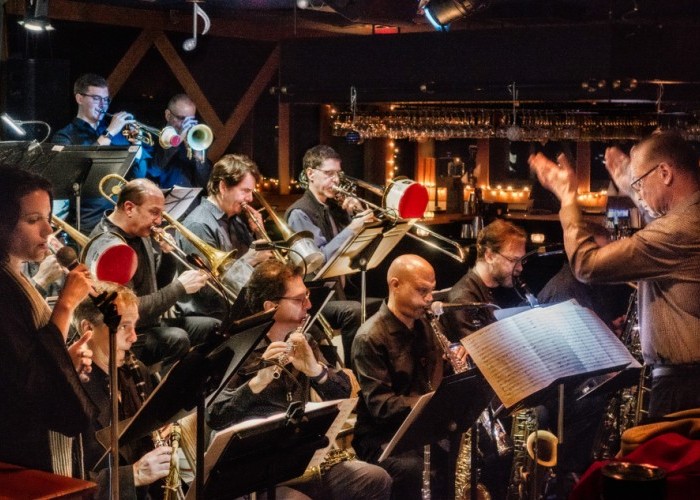Jan 13, 2026 2:09 PM
More Trump-Kennedy Center Cancellations
The fallout from the renaming of the John F. Kennedy Center for the Performing Arts to include President Donald…

Scott Reeves Jazz Orchestra recently issued Without A Trace on Origin.
(Photo: Dennis Connors)It wasn’t until trombonist/alto flugelhornist Scott Reeves moved to New York City in 1999 that he began to compose and arrange at the level he’d always envisioned.
“I’m either a late bloomer or a slow learner,” he joked after the May 12 release concert for Without A Trace (Origin), his second big band album, at Smalls. Or maybe he’s the best kind of bandleader—one who’s learned how to do it all.
To be sure, the qualities that make one a great player often are at odds with those of an exceptional arranger or composer. Soaring in concert often requires a willingness to abandon organized thought and to respond in the moment; conversely, arranging and composing require analysis and introspection.
“Sometimes I almost have to tell my analytical brain to shut up and let me play,” Reeves said. “But as a composer, [the analytical brain] is a very useful tool.”
In Reeves’ case, each of his skills informs the others. The decades he spent playing and arranging for big bands under the direction of Dave Liebman and Bill Mobley taught Reeves how to work within that classic big band sound. But for his own group, the 17-piece Scott Reeves Jazz Orchestra, he wanted to explore the dissonances and unexpected forms of contemporary jazz, emulating large ensembles like those of pianists Jim McNeely and Gil Evans, and fellow trombonist Bob Brookmeyer. The challenge was to find the right balance between tradition and experimentation.
“To take this instrumentation and find something different to do with it—it’s a daunting task,” said Steve Wilson, the orchestra’s featured saxophonist and Reeves’ associate for more than three decades. But it’s a task that Reeves achieves handily, Wilson added. Reeves arrives at his sound—modern metric ideas, sweetly stacked harmonies that move in surprising directions, atypical musical alliances across the different horn sections—by utilizing the full scope of his playing experience. If he can’t play it, he doesn’t write it.
His new album—a more eclectic mix of tunes than 2016’s all-original Portraits And Places (Origin)—illustrates the success of this approach. On the opening track, the Kurt Weill standard “Speak Low,” Reeves gives a harmonic nod to Bill Evans and his fleet swing version of the tune, even as the Afro-Cuban feel commands the listener’s focus. Similarly, on “JuJu,” Reeves references two distinct versions of Wayne Shorter’s iconic tune, one from the 1964 original and another from Shorter’s recent lead sheets; by placing the melody in the trombone line, rather than the saxophone line, Reeves reveals deep, unfamiliar colors in the famous composition. With a lesser arranger, or a lesser band, such departures might not have produced the clean, crisp sound for which Reeves is known.
The title track, “Without A Trace,” features vocals, another departure for Reeves as a composer. The song, a mélange of film-noir moodiness and tricky intervals, shows off not only Reeves’ way with a sung melody but his mastery of the lyricist’s pen. On the album, jazz singer Carolyn Leonhart interprets the tune with impressive precision. No less impressive was the performance of Brazilian vocalist Jamile Staevie at the Smalls gig. Staevie, who recently studied with Reeves at The City College of New York, sang with confidence and sensitivity, sacrificing none of the musical acumen Reeves’ charts demand.
This fall Reeves will enter semi-retirement after almost 40 years of university teaching. He plans to use his extra time to practice, rebuild his energy and write new music. How does he view his skills as a composer nowadays? “I’m still working at it,” he said, speculating that his best years might yet lie ahead. DB

Belá Fleck during an interview with Fredrika Whitfield on CNN.
Jan 13, 2026 2:09 PM
The fallout from the renaming of the John F. Kennedy Center for the Performing Arts to include President Donald…

Peplowski first came to prominence in legacy swing bands, including the final iteration of the Benny Goodman Orchestra, before beginning a solo career in the late 1980s.
Feb 3, 2026 12:10 AM
Ken Peplowski, a clarinetist and tenor saxophonist who straddled the worlds of traditional and modern jazz, died Feb. 2…

The success of Oregon’s first album, 1971’s Music Of Another Present Era, allowed Towner to establish a solo career.
Jan 19, 2026 5:02 PM
Ralph Towner, a guitarist and composer who blended multiple genres, including jazz — and throughout them all remained…

Rico’s Anti-Microbial Instrument Swab
Jan 19, 2026 2:48 PM
With this year’s NAMM Show right around the corner, we can look forward to plenty of new and innovative instruments…

Richie Beirach was particularly renowned for his approach to chromatic harmony, which he used to improvise reharmonizations of originals and standards.
Jan 27, 2026 11:19 AM
Richie Beirach, a pianist and composer who channeled a knowledge of modern classical music into his jazz practice,…